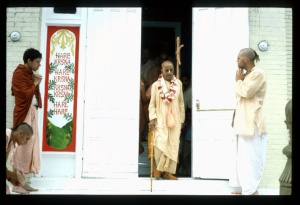SB 3.4.3

A.C. Bhaktivedanta Swami Prabhupada
TEXT 3
- bhagavān svātma-māyāyā
- gatiṁ tām avalokya saḥ
- sarasvatīm upaspṛśya
- vṛkṣa-mūlam upāviśat
SYNONYMS
bhagavān — the Personality of Godhead; sva-ātma-māyāyāḥ — by His internal potency; gatim — the end; tām — that; avalokya — foreseeing; saḥ — He (Kṛṣṇa); sarasvatīm — the River Sarasvatī; upaspṛśya — after sipping water; vṛkṣa-mūlam — at the foot of a tree; upāviśat — sat down.
TRANSLATION
The Personality of Godhead, Lord Śrī Kṛṣṇa, after foreseeing the end [of His family] by His internal potency, went to the bank of the River Sarasvatī, sipped water, and sat down underneath a tree.
PURPORT
All the above-mentioned activities of the Yadus and Bhojas were executed by the internal potency of the Lord because He wanted them to be dispatched to their respective abodes after He had finished His mission of descent. They were all His sons and grandsons and were given complete protection by the paternal affection of the Lord. How they could be vanquished in the presence of the Lord is answered in this verse: everything was done by the Lord Himself (svātma-māyāyāḥ). The Lord's family members were either incarnations of His plenary expansions or demigods from the heavenly planets, and thus before His departure He separated them by His internal potency. Before being dispatched to their respective abodes, they were sent to the holy place of Prabhāsa, where they performed pious activities and took food and drink to their heart's content. It was then arranged for them to be sent back to their abodes so that others could see that the powerful Yadu dynasty was no longer in the world. In the previous verse, the word anujñāta, indicating that the whole sequence of events was arranged by the Lord, is significant. These particular pastimes of the Lord are not a manifestation of His external energy, or material nature. Such an exhibition of His internal potency is eternal, and therefore one should not conclude that the Yadus and Bhojas died in a drunken state in an ordinary fratricidal war. Śrī Jīva Gosvāmī comments on these incidents as magical performances.